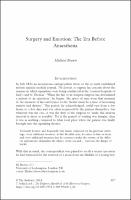Chapter 16 Surgery and Emotion
The Era Before Anaesthesia
Author(s)
Brown, Michael
Collection
WellcomeLanguage
EnglishAbstract
In this chapter I have endeavoured to demonstrate the ways in which an
approach that takes the emotions seriously might nuance and complicate
our understandings of the history of pre-anaesthetic surgery. In general,
historians have tended to focus on the operations of surgical dispassion, or
what we might now term clinical detachment. What this research suggests,
however, is that compassion and emotional expression played a surprisingly
important role in shaping the cultures of early nineteenth-century operative
surgery as well as the identities of its practitioners. In the decades immediately
preceding the advent of anaesthesia, pain became a central concern of
surgical discourse and the response to this concern was shaped by the cultures
of sentiment and sensibility. However, this culture of compassion was
no ‘natural’ reaction to a self-evident problem. Rather, it was a culturally
and historically contingent phenomenon which could be harnessed to the
ideologies and ambitions of medical reform. In the hands of men like John
Bell and Thomas Wakley, the image of the surgeon as a man of refined and
honest sentiment was linked to a critique of the medical and surgical ancien
regime, providing an idealised representation of a more expert, meritocratic
and altruistic profession.
Keywords
History; pre-anesthetic surgeryDOI
10.1057/978-1-349-95260-1_16OCN
1076650674Publisher
Springer NaturePublisher website
https://www.springernature.com/gp/products/booksPublication date and place
Basingstoke, 2018Grantor
Imprint
Palgrave MacmillanClassification
History of medicine
Surgery


 Download
Download